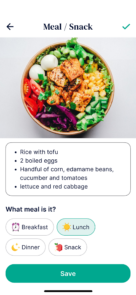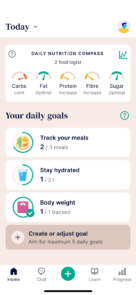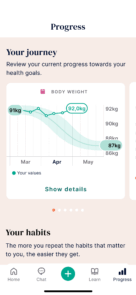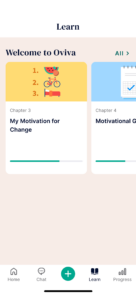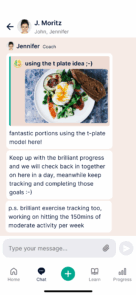
Overcoming a weight loss plateau: what it is, why it happens and tips from a dietitian
When you’re trying to lose weight, hitting a weight loss plateau can feel demotivating, but it’s important to know this is a common experience and one you can overcome. In this post, we’ll explore what a weight loss plateau is and what causes a plateau in weight while providing expert insights into how to overcome a plateau and continue your progress.
Oviva can help you understand your weight loss journey and overcome challenges like weight loss plateaus through tailored support from healthcare professionals. We can also provide access to prescription weight loss medication, like Wegovy, to assist you on your journey.
Key Takeaways
- A weight loss plateau occurs when your weight stops decreasing during weight loss.
- Hitting a weight loss plateau is normal and can have many causes, including metabolic changes, health conditions, medication and lifestyle.
- You may be able to break a weight loss plateau by adjusting your diet, increasing your physical activity levels, making changes to your lifestyle or simply by being patient.
- Oviva can help you to move beyond a weight loss plateau by offering professional support, weight loss tools and access to weight loss medication.
What is a weight loss plateau?
A weight loss plateau, also known as a weight loss stall, occurs when you’re on your weight loss journey and your weight stops decreasing. The concept of hitting a weight loss plateau is not a myth; it’s a real and common experience and can feel upsetting and confusing.
Experiences shared online may lead you to believe a plateau in weight will occur at a certain time, for example, after two weeks of dieting or after 10 lbs or 20 lbs of weight loss. In reality, weight loss can stall at any time, which is why individualised personal care is so valuable.

Why does weight loss plateau?
While the experience of plateauing weight loss is common, the underlying causes are not always straightforward, and there are multiple possible explanations to consider.
Five reasons for a weight loss plateau
1. Hitting your set point
One of the most common explanations for a weight loss plateau is hitting your body’s ‘set point’. You can think of your set point as your body’s required level of stored fat. As you lose weight, your body tries to retain what it considers normal fat storage. It does this by lowering your metabolism, so you burn fewer calories than you did when you weighed more.
This “set point” isn’t just one exact number—it’s more like a range your body feels comfortable in.
When you’re trying to lose weight and hit a plateau, it’s your body trying to stay in that comfort zone. The way to work around this is by making steady, sustainable changes to your habits (like eating healthier or being more active) and sticking with them.
It’s also important not to stress about a single “off day” where you eat more or move less than usual, or if your weight doesn’t drop right away. What matters most is staying consistent with your new habits over the long term—these will help shift your body’s set point over time. Don’t let small setbacks discourage you.
2. Difficulty following your weight loss plan
Sticking to a diet or weight loss plan can be challenging if you’re experiencing stress, lack of sleep, or an overly restrictive diet.
Stress can trigger cravings for comfort foods, while poor sleep disrupts hormones that control hunger, making you feel hungrier or less full. Diets that are too low in calories may leave you malnourished, drained and unmotivated, making it harder to stick to healthy habits.
Instead of aiming for perfection, focus on small, sustainable changes and ensure you’re getting enough sleep, managing stress, and eating a balanced diet to support your overall well-being and weight loss goals.
3. Loss of muscle mas
As you lose weight, you may also lose muscle mass, which can reduce the amount of calories your body needs. If you consume more calories than your body needs, your weight may plateau or even increase.
This is why strength training to minimise muscle loss is so important on your weight loss journey.

4. Health conditions
Certain health conditions are associated with weight loss plateaus, including polycystic ovary syndrome (PCOS) and type 1 and type 2 diabetes. You may also experience a plateau in your weight if you begin a new medication or make changes to existing medications.
If you have relevant health conditions or you’re starting or changing medications, it may help to talk to a healthcare professional about weight management and create a plan of action.
This is where Oviva can help. With NHS-funded programmes, Oviva provides expert support and groundbreaking weight loss medications, proven to help you lose and maintain a healthier weight. Access personalised plans, expert advice, and convenient remote care via the Oviva app.
Take a step toward achieving your weight loss goals today.
5. Other reasons for weight loss plateaus
Some of the other potential causes of a weight loss plateau include constipation, alcohol consumption or issues with your hormones. Hormonal issues can include insulin resistance or an underactive thyroid (hypothyroidism). You may also find it harder to shift weight following bariatric surgery.
Can weight loss plateau on weight loss medication?
You can still hit a weight loss plateau even if you’re taking weight loss medication, and there are several possible reasons for this.
Your dosage for the medication will gradually increase over many weeks, so you may experience a plateau just before a scheduled increase as your body becomes used to the medication at the current dosage level.
You must ensure you’re implementing broader lifestyle changes alongside the medication, such as improving your diet and increasing physical activity. It’s possible a plateau could be caused by not adhering to these changes or making insufficient changes to your lifestyle. For more information, find out five ways to increase weight loss on Wegovy.
Some people experience side effects that may contribute to a weight loss plateau, such as constipation. These side effects usually subside naturally over time.
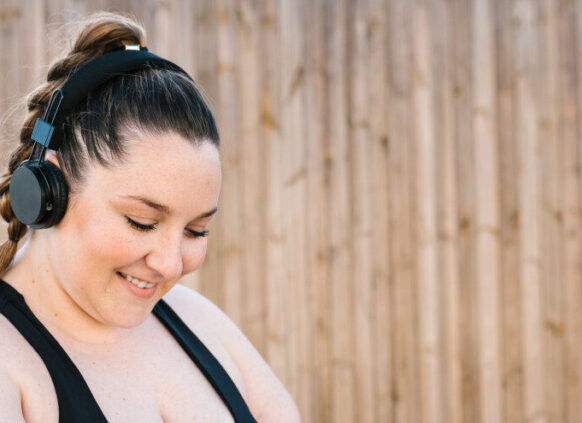
How weight loss plateaus can affect women differently
Women face some unique challenges with weight loss plateaus, which can make tailored coaching and personalised care even more important.
For example, you may find your weight loss stagnates around the time of your period due to hormonal fluctuations and other changes to the body, such as bloating. You may also need to be mindful of cravings or emotional eating during this time if these are symptoms you experience during your period. Recognising these patterns and planning meals or snacks that align with your goals can help you stay on track.
Certain health conditions that affect women, like PCOS, can make weight loss more challenging and can increase the likelihood of hitting a plateau in weight. Explore more about losing weight with PCOS.
If you’ve recently been pregnant, your body’s changes associated with the postpartum period, including breastfeeding, may also contribute to weight loss plateaus. Our article on pregnancy and overweight can help you understand weight loss before, during and after pregnancy.
How long does a weight loss plateau last?
A weight loss plateau may last as little as a few weeks or as long as several months, and there are no guarantees on this length. Everybody’s weight loss journey is different, and weight loss plateaus have different underlying causes and potential solutions.
It’s also important to understand that weight loss plateaus can occur at any time during a weight loss programme. A 2014 study (Diana M. Thomas et al.) found that common time frames include 6 months into a low-calorie diet or between 1 year and 2 years. Nevertheless, you could just as easily hit a plateau in weight before the 6-month mark.
How to break a weight loss plateau
Now that you have an understanding of what a weight loss plateau is and how a plateau in weight loss can happen, it’s important to explore ways to overcome this issue:
Reduce simple carbohydrates and revisit portion sizes
You can try and break through your weight loss plateau by altering your diet.
This can include reducing your simple carbohydrate intake. Start with simple swaps, like eating cauliflower rice instead of white rice or butternut squash wedges instead of chips or fries.
These swaps can help to regulate your blood glucose levels.
It’s also worth revisiting your portion sizes. You don’t necessarily need to count calories, but you should be mindful of broadly how many calories you need to eat to lose weight.

Include a source of protein in your meals
Another great addition you can easily include in your diet is lean protein. Increasing your protein intake can help get you back on the weight loss cycle by reducing hunger and preventing muscle mass loss, especially when combined with strength training.
Examples of foods that are rich in protein include yoghurt, beans, lean meat and fish, nuts, seeds and cheese, but try to avoid eating too many high-calorie cheese products.
It may be beneficial to follow a healthy diet plan, so you build up an understanding of how to get the right nutrients.

Be as active as possible
Moving your body often is key to improving your health and well-being, providing physical and psychological benefits. Often, increasing your exercise can help to restart your weight loss.
However, if hitting the gym or 10 km runs aren’t your thing, making small changes to your day-to-day life can have a huge impact. Standing up instead of sitting at your desk can be a great start. Going for a walk or even opting for the stairs rather than an escalator can be small and simple ways to keep moving and increase your overall daily activity.
Avoid alcohol
It’s essential to be aware of your alcohol intake, but even more so when trying to lose weight. Alcohol can interfere with weight loss due to the consumption of “empty calories” found in the alcohol itself. Alcohol also stimulates your appetite, making it easier to overeat, and this can prevent weight loss. Avoiding alcohol will support you on your weight loss journey.
Reducing alcohol will not only help you to overcome a weight plateau, but it also has other key benefits, such as improved blood glucose and blood pressure, a reduction of fatty build-up around the liver, better sleep, and a decrease in headaches, nausea and stomach upset.
Eat more fibre
High-fibre foods promote weight loss and can help you feel fuller for longer.
When creating your next meal plan or doing your weekly shop, consider what types of food you regularly consume and make a conscious effort to include foods containing high levels of fibre, such as beans, lentils, wholegrains and berries.
Filling half of your plate with low-calorie, high-fibre vegetables helps you to fill up at meal times and reduce your overall calorie intake at the same time. The vegetables will also provide many essential vitamins and minerals to aid your overall health.
Stay hydrated
Hydration can help you to feel energised, but it can also improve your digestion, memory and mood. If you often drink fizzy drinks with high levels of sugar, try opting for water, a sugar-free cordial or occasional sugar-free fizzy drinks instead.
The NHS recommends aiming for 6 to 8 glasses of liquid every day. This includes water, sugar-free drinks and low-fat milk. Try to limit fruit juice to a maximum of one small glass per day.
Try to lower your stress
Although changing your lifestyle and losing weight can feel like the most important thing going on right now, make sure you check in with yourself and make time to do the things you enjoy.
Seeing family and friends, walking your dog or watching your favourite TV show is allowed. If you don’t enjoy yourself during your weight loss journey, you will quickly lose motivation and can fall into old habits.
Keep track of what you eat
Keeping a food log or diary can be an excellent tool for you when trying to lose weight. It can allow you to reflect on your progress regarding eating habits and better understand your connections between food and weight loss.
A food diary can help you stay on track, understand your daily food intake, and be accountable for your choices. This is especially important during the weight plateau phase, when you may feel less motivated and easily slip into old habits.

Join a weight loss programme
Another effective way to overcome a weight loss plateau is to join a weight loss programme like Oviva. A high-quality weight loss programme can provide you with expert help and psychological support. It will also assist you in forming healthy weight loss habits.
If you’re eligible, you’ll have access to weight loss injections like Wegovy. Understanding how to increase weight loss on Wegovy could help you beat a plateau in weight.
What not to do if your weight loss plateaus
If you hit a weight loss plateau, you may feel upset or frustrated, but it’s vital to take sensible measures to overcome it and avoid drastic action.
Don’t attempt to severely restrict your calories without supervision from a healthcare professional, and avoid skipping meals or over-exercising, as you may cause your body harm. Steer clear of weight loss pills or supplements unless you have medical assistance.
Most importantly of all, don’t give up. Plateaus in weight are normal and don’t necessarily mean you’re doing something wrong. They can also present an excellent opportunity to reflect and learn more about yourself. Try to reframe your plateau and embrace this learning and discovery process. Minor adjustments and patience can also go a long way.
Why weight loss plateaus are normal
While it can be frustrating, remember that almost everyone on a weight loss journey will experience a plateau at some point and perhaps even multiple plateaus. Although it can feel demotivating, it’s important to remember how much you’ve achieved already and the broader positive impact you’re having on your health rather than only focusing on the scales.
Try to bear in mind that plateaus can be overcome, and your feelings of sadness or frustration will not last. It’s important to be kind to yourself, focus on things you enjoy, and prioritise your mental well-being, as you want to avoid falling back into your old habits.

Don’t go on your weight loss journey alone
Hitting a weight loss plateau is challenging, but it can be made easier if you choose not to go on your weight loss journey alone. Professional support can be a game changer when it comes to overcoming weight loss stalls and dealing with emotional hurdles.
Oviva offers a personalised approach to weight management and can provide emotional support as well as practical assistance. A team of healthcare professionals will be able to work with you to set goals and create a weight loss plan. You’ll also be able to access weight loss medication, like Wegovy, and learn what to expect in the first weeks.
The Oviva app makes it easy to track your weight loss, meals, mood and exercise, and you’ll also have direct communication with a real-life coach who can offer guidance and support. The ability to ask questions and seek advice can be invaluable for beating plateaus in weight.
Oviva users lose an average of 13.6 kg in 12 months.

